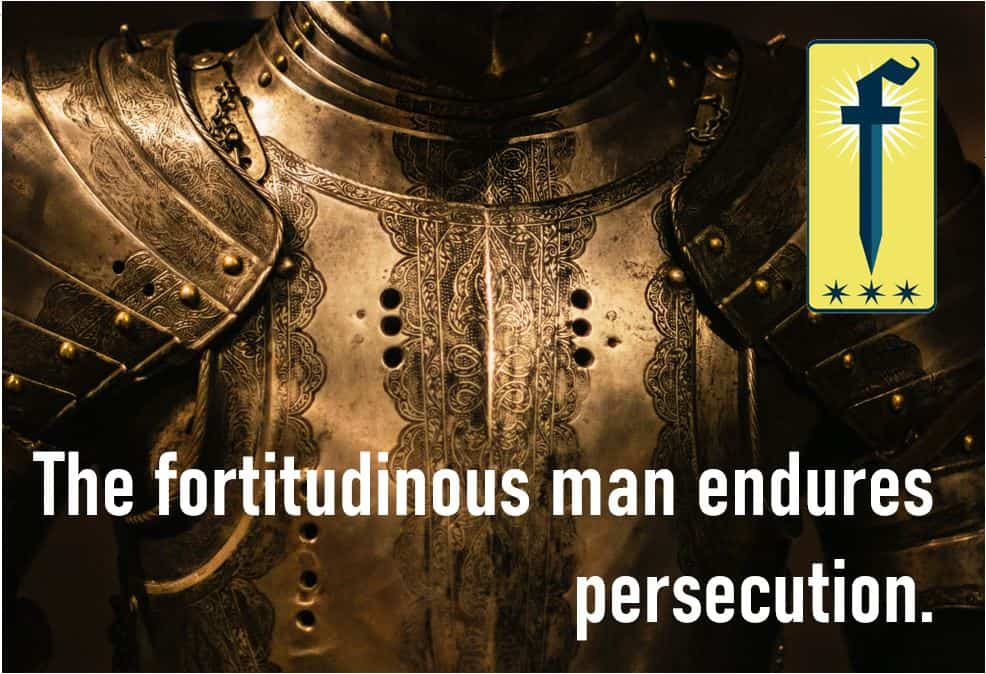The Fortitudinous Man Endures Persecution

From the Fraternus Book for the 28th Sunday of OT:
Fortitude is endurance in the face of danger, suffering and difficulty. Faithful Christians will always face persecutions (Christ promised it).
Therefore…
The fortitudinous man endures persecution.
We Will Have to endure Persecution
- by Jason Craig
To speak of virtue is to speak of action – not ideas, sentiments, or fluff. The cardinal virtues are the hinges of the good and worthwhile life, not the aspirations of those engineering an “image” for themselves. The cardinal virtues all need each other to be complete, and we need these virtues to be men facing a real world with real threats.
Prudence bridges right thinking and right acting, but it’s neither one of those if the thought and the act is not just, if its not right. Justice is doing what is right, so the moment something is birthed into real action through prudence, that act is immediately judged by whether it caused harm to another or failed to give another (God included) his due. This is why the justice and prudence are so intertwined. If an act is prudent, it is just; if it is just, it is prudent.
Fortitude and temperance are also intertwined. If an act is conceived and acted upon in prudence and justice, it then faces two unavoidable challenges. Justice (right action) will be challenged from without through persecution, etc. and from within through the rebellion of our passions. For the latter, we need temperance to deny ourselves in order to pursue what we know to be true and right. But for the former – threats from without – we need fortitude in order to endure.
Fortitude is also known as bravery, and it is a virtue and it is necessary because, in this life, we will always face threats to right action. In fact, if your way of life “costs” you little, then it’s likely you are not pursuing justice. This world has a dark prince who sows discord, disunity, and injustice (John 8:14, 16:7-11). All sins, after all, are acts of injustice. If we want to persevere in what is right, we must face this fact and face the work of that dark prince. If we never endure persecution then it is not a stretch to presume we are not facing evil as we should, but being complicit or lazy about it.
We should fear things because they can cause us to suffer. Evil should shake us. Fearlessness is not a virtue – Aquinas calls is a vice because God gave us fear to help us recognize and respond properly to danger. You can only endure what causes some sort of harm. Therefore, fear is a fact of fortitude – but it’s not the end of the story. In the face of something that causes us to fear, like persecution, fortitude reminds us of our higher callings, it steels us when we need it most. When we face persecution, we should remember that Jesus said the day would come. “If the world hates you, be sure that it hated me before it learned to hate you. If you belonged to the world, the world would know you for its own and love you; it is because you do not belong to the world, because I have singled you out from the midst of the world, that the world hates you” (John 15:18-19).
It is only because of the “danger” of seeking virtue (justice) that we have the possibility of having fortitude – and the guarantee. Now, this does not mean we go “looking for trouble.” The early Church, for example, did not tell people to run to their martyrdom. Self-preservation is a natural instinct that seeks to preserve life, and life is good. But, when we truly seek justice, it is nearly impossible that we will not find causes that cause suffering. If the cause is right, if it is “worth it,” then it is “worth” the sacrifice of our very selves. We face it boldly, not because boldness itself is praiseworthy, but the willingness to be bold for the right thing is. Because he has set himself on the path to heaven, the highest and most worthy of causes, he will endures persecution readily when it comes. And it will.
From the spiritual classic Intro to the Devout Life by St. Francis de Sales (Part IV, ch. 2):
And a note from the Catechism…
2471 Before Pilate, Christ proclaims that he “has come into the world, to bear witness to the truth.” The Christian is not to “be ashamed then of testifying to our Lord.” In situations that require witness to the faith, the Christian must profess it without equivocation, after the example of St. Paul before his judges. We must keep “a clear conscience toward God and toward men.”
Share This Post


